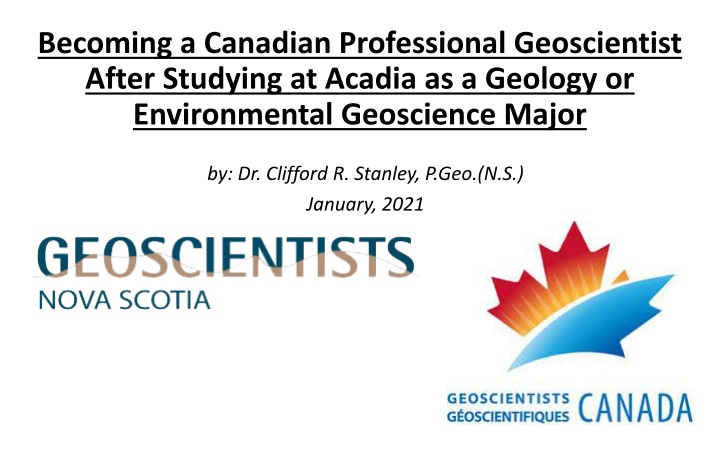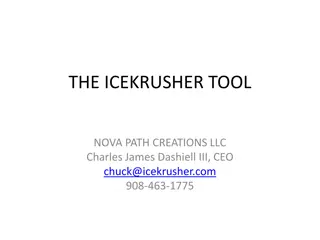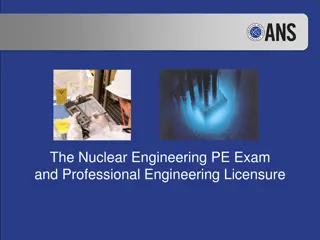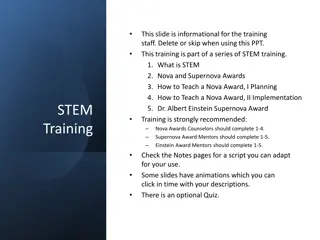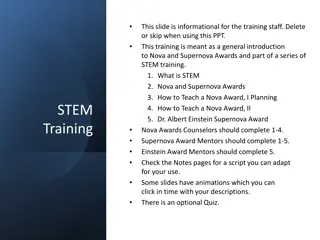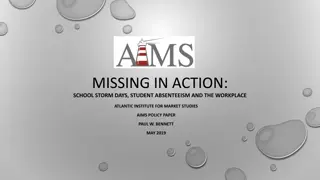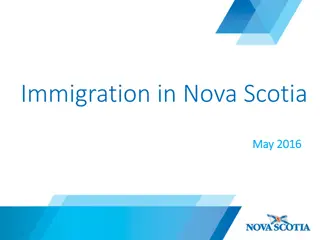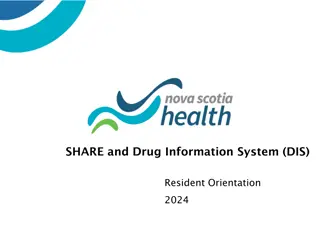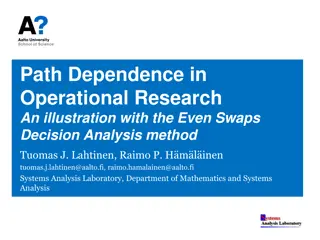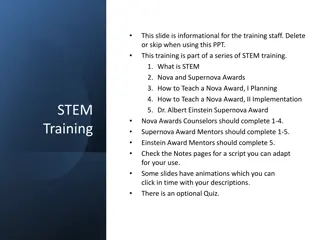Path to Becoming a Professional Geoscientist in Nova Scotia
Discover the essential steps to become a Professional Geoscientist in Nova Scotia after studying Geology or Environmental Geoscience at Acadia. Understand the requirements, knowledge, and experience needed to excel in the field. Explore the vital role of Professional Geoscientists in various industries and regions.
Download Presentation

Please find below an Image/Link to download the presentation.
The content on the website is provided AS IS for your information and personal use only. It may not be sold, licensed, or shared on other websites without obtaining consent from the author.If you encounter any issues during the download, it is possible that the publisher has removed the file from their server.
You are allowed to download the files provided on this website for personal or commercial use, subject to the condition that they are used lawfully. All files are the property of their respective owners.
The content on the website is provided AS IS for your information and personal use only. It may not be sold, licensed, or shared on other websites without obtaining consent from the author.
E N D
Presentation Transcript
Becoming a Canadian Professional Geoscientist After Studying at Acadia as a Geology or Environmental Geoscience Major by: Dr. Clifford R. Stanley, P.Geo.(N.S.) January, 2021
Outline Introduction Professional Geoscientists of Nova Scotia Definition of Geoscience / Geoscientist Professional Geoscientist Act P.Geo. (N.S.) Admission Requirements Knowledge Requirements Acadia Major/Honours Geology Degree Acadia Major/Honours Environmental Geoscience Degree Experience Requirements Questions?
Introduction where do Acadia GEOL & ENGO students work after they graduate? Exploration & Mining Exploration & Petroleum Environmental Government Academic if you intend to work independently in these fields, regulations require that you become a Professional Geoscientist this allows you to: practice independently undertake certain, special geoscience tasks (see below)
Introduction If you aren t a professional geoscientist, there will be restrictions to practice in your field of expertise Your field of expertise is determined by the university courses you have passed, and the type of geoscience experience you have thus, at Acadia, you must take the right courses to allow you to work in your desired field obviously, you need to make the proper course selections early in your academic career, so you have the pre-requisites that you need to take the courses you want to take Drs. Raeside and O Driscoll are aware of this, and will help to guide you though this process when they advise you on course selections each year
Professional Geoscientists in Nova Scotia You must be a Professional Geoscientist (P.Geo.) to practice geoscience in: Nova Scotia all other provinces and territories in Canada most of the United States (~35 states) other countries (e.g., UK, Australia, NZ, South Africa, Namibia, Ireland, EU)
Professional Geoscientists in Nova Scotia you must be a P.Geo. to become a qualified person and a site professional (terms defined in a variety of NS legislative acts involving petroleum and mineral exploration, and the environment) these titles allow you to undertake a variety of tasks In the petroleum and mining fields, as a qualified person you can: plan and manage exploration programs write assessment reports, feasibility studies, technical stock exchange exploration & mining announcements In the geo-environmental field, as a site professional you can: perform environmental monitoring & remediation activities plan, design (with an engineer), and supervise environmental monitoring and remediation activities
Professional Geoscientists in Nova Scotia so who needs to be a P.Geo.? Geologists we have this degree at Acadia Environmental Geoscientists we have the degree at Acadia Geophysicists we do not have degree at Acadia Geochemistry is not a recognized stream, except in BC; elsewhere, geochemists register as geologists or environmental geoscientists, depending on their orientation these are the three streams recognized nationally by the Canadian Geoscience Standards Council (the group that sets the national geoscience standards)
Definition What is the Practice of Geoscience ? the performing of any activity that requires application of the principles of the geological sciences, and that concerns the safeguarding of public welfare, life, health, property, or economic interests, including, but not limited to: Geological Exploration investigations, interpretations, evaluations, consultations or management aimed at discovery or development of metallic or non- metallic minerals, rocks, nuclear or fossil fuels, precious stones and water resources; and (note that this does not include rock quarries) Public Well-Being & Environment investigations, interpretations, evaluations, consultations, or management relating to geoscientific properties, conditions or processes that may affect the well-being of the general public, including those pertaining to preservation of the natural environment.
Professional Geoscientist Act to be a Professional Geoscientist in Nova Scotia, you must join and be a member of the Association of Professional Geoscientists of Nova Scotia (APGNS; AKA Geoscientists NS) the APGNS admits P.Geo.s using the guidelines and procedures established by the Canadian Geoscience Standards Council for professional registration other provinces have similar professional geoscience associations, in some cases joined with the engineers, that have a similar purpose and operate in a similar manner (note that in our federal constitution, regulation of the professions is a provincial responsibility; also note that Quebec s system is a bit different from this, for various legal and historical reasons) The Canadian Geoscience Standards Council attempts to standardize professional geoscience registration across the country, and thereby allow easy qualification transfer
Professional Geoscientist Act The Nova Scotia Professional Geoscientist Act gives the APGNS, the authority to: admit members with suitable credentials investigate, judge and discipline members for malpractice Requires the APGNS to keep a public record of disciplinary actions (unlike doctors, lawyers, etc. - which don t make their disciplinary hearings or records public) The NS Professional Geoscientist Act allows Nova Scotia P.Geo.s to: automatically be able to practice geoscience in Nova Scotia allows them to become members of another professional geoscientist association in another province, state or country merely by paying their registration fees; you HAVE TO register though; in Canada, it s a simple form, with email confirmation => quick) note that there is no such thing as incidental practice , meaning you officially can t undertake geoscience work in another province for a couple of days ; you HAVE TO register there too!
Professional Geoscientist Act The Nova Scotia Professional Geoscientist Act does not allow an un-registered geoscientist to: advertise themselves as a geoscientist , geologist , geophysicist , geochemist , mineralogist , paleontologist , stratigrapher , structural geologist , or any other sub-discipline practitioner or professional work independently in the field of geoscience (i.e. without a boss who is a professional geoscientist) submit assessment reports, other government prospecting documents, stock market exploration/mining announcements, or feasibility studies (including preliminary economic assessments and pre-feasibility studies)
Professional Geoscientist Act The Nova Scotia Professional Geoscientist Act also requires Nova Scotia P.Geo.s to: participate in a professional development program to continue to enhance their abilities and knowledge while on the job practice geoscience in an ethical manner that will maintain public safety and protect the environment
P.Geo. Admission Requirements to join the APGNS, you are required to satisfy five requirements achieve knowledge (pass the necessary curriculum approximately equivalent to a 4-year Canadian honours geology program) achieve experience (48 months of experience as a member-in-training - MIT) have four references (3 must be geoscientists/engineers) adequately speak an official language of the province pass a professional practice/ethics exam (ensuring you have local knowledge of relevant laws, ethical issues; the curriculum and text is provided in advance by the APGNS) obviously, Acadia students need to know what these knowledge requirements are!
Knowledge Requirements common to all streams (Geologist, Geophysicist, Environmental Geoscientist) 3 Compulsory Foundation Science Educational Units (EUs) Mathematics (1styear calculus, statistics, matrix algebra, number theory) Physics (intro, 1styear, w/lab) Chemistry (intro, 1styear, w/lab) 6 Additional Foundation Science EUs up to two from each subject Mathematics (1styear calculus, statistics, matrix algebra, number theory) Physics (intro, 1styear, w/lab) Chemistry (intro, 1styear, w/lab) Biology (intro, 1styear, w/lab) Statistics (see above) Computer Programming (coding in relevant, modern computer language) Note: EU = educational unit is basically a one-semester/one-term course at Acadia Note: except for Mathematics and Statistics, these courses must have lab and must be >= 1st year university level AND acceptable for credit in a degree in science or applied science/engineering
Knowledge Requirements common to all streams (Geologist, Geophysicist, Environmental Geoscientist) 4 Compulsory Foundation Geoscience EUs Field Techniques Mineralogy and Petrology Sedimentation and Stratigraphy Structural Geology Note: the material in these educational units may be equivalently studied as material in several courses; regardless, these courses must be acceptable for credit toward a degree in geoscience
Knowledge Requirements different for each stream 5 Additional Foundation Geoscience EUs GEOLOGY Geochemistry Geophysics ENV GEOSCIENCE Geochemistry Geophysics GEOPHYSICS Digital Signal Processing Global Geophysics Igneous Petrology Metamorphic Petrology Sedimentary Petrology Hydrology/Hydrogeology Engineering Geology Seismology & Seismic Methods Geomorphology/Soil Science Glacial Geology Remote Sensing Exploration Geophysics Sedimentology Glacial Geology/Geomorphology Remote Sensing Potential Fields & Radiometrics Electrical/Electromagnetic Methods Note: Geology and Environmental Science require 1 or 2 EUs from each sub-group, but only one from each subject Note: Geophysics requires 1 EU from 5 of the 6 sub-groups
Knowledge Requirements common to all streams (Geologist, Geophysicist, Environmental Geoscientist) 9 Other Geoscience/Science EUs An extensive list is available on pages 7-9 and 12-21 in the Canadian Geoscience Standards Council s General Knowledge and Experience (GKE) document: https://geoscientistscanada.ca/wp-content/uploads/2019/02/GC-Knowledge- Requ.BKLT-.REV-.EN-.web-.final-.pdf Basically, any geoscience or environmental science course offered at Acadia, and many other science courses that relate to geoscience, will qualify (e.g., CHEM 2853 - Environmental Analytical Chemistry; ENVS 3423 Environmental Impact Assessment; BIOL 2033 - Ecology; APSC 3413 - Environmental Engineering) Note: these courses must be 2nd year or higher and acceptable as a science credit toward a degree in science or applied science/engineering and must be relevant to geoscience Note: GEOL 1033 (Oceanography), GEOL 1073 (Natural Disasters), CHEM 1053 (Chemistry in the Modern World), PHYS 1513/1523 (Astronomy), PHYS 1543 (Energy), PHYS 1553 (Physics of Music), PHYS 1563 (Physics in the Environment) do not satisfy these requirements
Knowledge Requirements - Summary common to all streams (Geologist, Geophysicist, Environmental Geoscientist) Geoscience Courses = 18 (note that the APGNS does not stipulate you need to take introductory geology courses; i.e., GEOL 1013 & GEOL 1023; however, you will need to have taken them as pre- requisites for the 18 advanced Geoscience courses you do need to take at Acadia) Introductory (First Year) Geoscience Courses = 2 Total Geoscience Courses = 20 + Other Science Courses = 9 (29 science courses in all) How do these EUs match up with Acadia Geology & Env. Geoscience Major & Honours Degree programs?
Acadia Major Geology Degree 4 Other Science Courses (from MATH, PHYS, CHEM, BIOL, COMP, APSC; must have 4 for minor) CORE Physical Geology (1013) Historical Geology (1023) Mineralogy (2133) History of Life (2213) Petrology & Stratigraphy (2043) Geomorphology (2703) Field Methods (2083) Sedimentary Geology (3303) Igneous Petrology (3403) Metamorphic Geology (3503) Structural Geology (3603) Global & North American Geology (4103) 5 ELECTIVES Atmosphere, Weather & Climate (2753) Hydrogeology (3723) Geochemistry (3103; alternate years, opposite 3823) Geophysics (3823; alternate years, opposite 3103) Energy Sources (4843; alternate years, opposite 4713) Quaternary Geology (4713; alternate years, opposite 4843) Mineral Deposits (4803) Advanced Field School (4083) Geochemical Material Transfer (4823) Mineral Exploration (4813) Applied Geochemistry (4833) PRE-REQUISITES Chemistry (1013 & 1023) Physics (1053 & 1063) Math (1013 & 1023 - calculus, 2233 & 2243 statistics, or 1333 & 2313 matrix algebra) < blue courses only taught with parallel grad course >
Acadia Honours Geology Degree 4 Other Science Courses (from MATH, PHYS, CHEM, BIOL, COMP, APSC; must have 4 for minor) CORE Physical Geology (1013) Historical Geology (1023) Mineralogy (2133) History of Life (2213) Petrology & Stratigraphy (2043) Geomorphology (2703) Field Methods (2083) Sedimentary Geology (3303) Igneous Petrology (3403) Metamorphic Geology (3503) Structural Geology (3603) Global & North American Geology (4103) Honours Thesis (4996) 5 ELECTIVES Atmosphere, Weather & Climate (2753) Hydrogeology (3723) Geochemistry (3103; alternate years, opposite 3823) Geophysics (3823; alternate years, opposite 3103) Energy Sources (4843; alternate years, opposite 4713) Quaternary Geology (4713; alternate years, opposite 4843) Mineral Deposits (4803) Advanced Field School (4083) Geochemical Material Transfer (4823) Mineral Exploration (4813) Applied Geochemistry (4833) PRE-REQUISITES < blue courses only taught with parallel grad course > statistics, or 1333 & 2313 matrix algebra) Chemistry (1013 & 1023) Physics (1053 & 1063) Math (1013 & 1023 - calculus, 2233 & 2243
Course Totals Geology Major Geology Honours 19 Geology Courses (20) 10 Other Sciences (9) 29 Science Courses Total (29) 17 Geology Courses (20) 10 Other Sciences (9) 27 Science Courses Total (29) Need to: Take one Geology course as a university (free) elective Take either Geochemistry or Geophysics as one of your geology electives Need to: Take three Geology courses as university (free) electives Take either Geochemistry or Geophysics as one of your geology electives Note: you can reduce (by one) the # of Geology courses you must take as free electives by ensuring that the extra (10th) science course required for your degree is relevant to geoscience, making it satisfy the Other Geoscience/Science requirement
Acadia Major Environmental Geoscience Degree Math (1013 & 1023 - calculus, 2233 & 2243 - statistics, or 1333 & 2313 matrix algebra) Biology (1113 & 1123) 4 Other Science Courses (from MATH, PHYS, CHEM, BIOL, COMP, APSC; must have 4 for minor) CORE Physical Geology (1013) Historical Geology (1023) Environmental Science I (1013) Environmental Science II (1023) Mineralogy (2133) History of Life (2213) Petrology & Stratigraphy (2043) Field Methods (2083) Geomorphology (2703) Geochemistry (3103; alternating yearly with 3823) Geophysics (3823; alternating yearly with 3103) Hydrogeology (3723) Sedimentary Geology (3303) Structural Geology (3603) Legal Issues (3113) Environmental Impact Assessment (3423) 3 ELECTIVES Atmosphere, Weather & Climate (2753) Contaminants in the Environment (3613) Energy Sources (4843; alternating yearly with 4713) Quaternary Geology (4713; alternating yearly with 4843) Global & North American Geology (4103) Mineral Deposits (4803) Advanced Field School (4083) Geochemical Material Transfer (4823) Mineral Exploration (4813) Applied Geochemistry (4833) PRE-REQUISITES < blue courses taught with parallel grad course > Chemistry (1013 & 1023) Physics (1053 & 1063)
Acadia Honours Environmental Geoscience Degree Math (1013 & 1023 - calculus, 2233 & 2243 - statistics, or 1333 & 2313 matrix algebra) Biology (1113 & 1123) 4 Other Science Courses (from MATH, PHYS, CHEM, BIOL, COMP, APSC; must have 4 for minor) CORE Physical Geology (1013) Historical Geology (1023) Environmental Science I (1013) Environmental Science II (1023) Mineralogy (2133) History of Life (2213) Petrology & Stratigraphy (2043) Field Methods (2083) Geomorphology (2703) Geochemistry (3103; alternating yearly with 3823) Geophysics (3823; alternating yearly with 3103) Hydrogeology (3723) Sedimentary Geology (3303) Structural Geology (3603) Legal Issues (3113) Environmental Impact Assessment (3423) Honours Thesis (4993A and B) (counts as 2 EUs) 3 ELECTIVES Atmosphere, Weather & Climate (2753) Contaminants in the Environment (3613) Energy Sources (4843; alternating yearly with 4713) Quaternary Geology (4713; alternating yearly with 4843) Global & North American Geology (4103) Mineral Deposits (4803) Advanced Field School (4083) Geochemical Material Transfer (4823) Mineral Exploration (4813) Applied Geochemistry (4833) < blue courses taught with parallel grad course > PRE-REQUISITES Chemistry (1013 & 1023) Physics (1053 & 1063)
Course Totals Environmental Geoscience Honours Environmental Geoscience Major 16 Geology/ENVS Courses past 1st year (20) 10-12 Other Sciences (9) 26-28 Science Courses Total (29) 18 Geology/ENVS Courses past 1st year (20) 10-12 Other Sciences (9) 28-30 Science Courses Total (29) Need to: May need one Geology or Environmental Science course as a university (free) elective Need to: Take one three Geology or Environmental Science courses as a university (free) elective Note: you can reduce (by one) the # of Geology courses you must take as free electives by ensuring that the extra (10th) science course required for your degree is relevant to geoscience, making it satisfy the Other Geoscience/ Science requirement
P.Geo. Admission Requirements During your time at Acadia: make sure (w/Drs. Raeside or O Driscoll) you take the right courses to satisfy the appropriate knowledge requirements Then, after completing your degree: apply for status as an MIT in the APGNS (preferred for Acadia BSc & MSc students, including Fleming transfers) or other provincial equivalents (resume booster!); apply in your graduation year & avoid the $100 application fee get a job in the geology/geo-environmental field be mentored by a professional geoscientist and keep a log of the work & responsibilities you undertake, including what you learned on the job after 48 months of geoscience experience that is cumulative and progressive in responsibility and technical achievement, you can apply for full membership to the APGNS and become a professional geoscientist if you are a NS MIT and working in another province at that time, you should become a P.Geo. in NS first, and then transfer your membership to the professional geoscience association in that province (MITs can t transfer)
Questions ? for more information regarding the Canadian P.Geo admissions requirements, see the Geoscientists Canada website containing the CGSC recommendations: https://geoscientistscanada.ca/wp content/uploads/2019/02/GC-Knowledge-Requ.BKLT-.REV-.EN-.web- .final-.pdf or the APGNS website containing province-specific information: http://www.geoscientistsns.ca/ for more information about the Nova Scotia Geoscience Act, see the NS government website at: https://nslegislature.ca/sites/default/files/legc/statutes/geosprof.htm
Questions ? if you have any additional questions about this presentation, please contact: Dr. Cliff Stanley, P.Geo. NS CGSC member, member of the APGNS Admissions Board HSH 335, 585-1344, cliff.stanley@acadiau.ca Dr. Rob Raeside GEOL Advisor HSH 329.1, 585-1323, rob.raeside@acadiau.ca Dr. Nelson O Driscoll ENGO Advisor KCIC LL 55, 585-1679, nelson.odriscoll@acadiau.ca if you have any questions about registration, the registration process, eligibility, etc. please contact: David Carter APGNS Registrar 902-229-1315, registrar@geoscientistsns.ca Thank You !
